Deloitte's Organisation Behaviour: Motivation, Teams, and Culture
VerifiedAdded on 2023/06/12
|15
|4684
|238
Report
AI Summary
This report provides an analysis of organisation behaviour within Deloitte, a multinational professional services network. It explores the influence of organisational culture, politics, and power on individual and team behaviour and performance. The report evaluates content and process theories of motivation, including Maslow's Hierarchy of Needs, Herzberg's Two-Factor Theory, Vroom's Expectancy Theory, and Skinner's Reinforcement Theory, and how motivational techniques enable effective achievement of organisational goals. It further explains the characteristics of effective versus ineffective teams, highlighting the importance of shared goals, commitment, and communication. The analysis incorporates concepts and philosophies of organisational behaviour, providing insights into how Deloitte can enhance employee motivation, improve team dynamics, and foster a positive organisational culture to drive success.
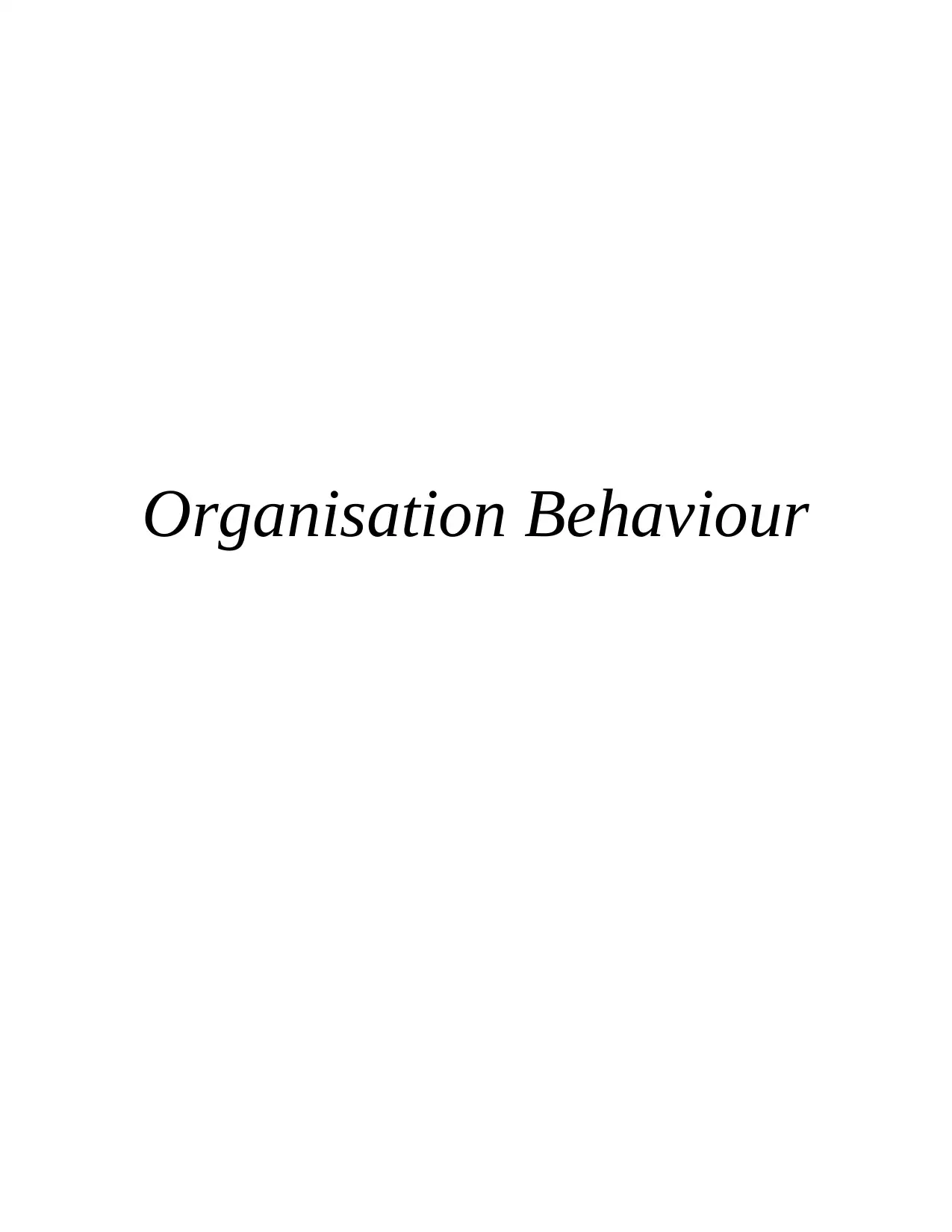
Organisation Behaviour
Paraphrase This Document
Need a fresh take? Get an instant paraphrase of this document with our AI Paraphraser
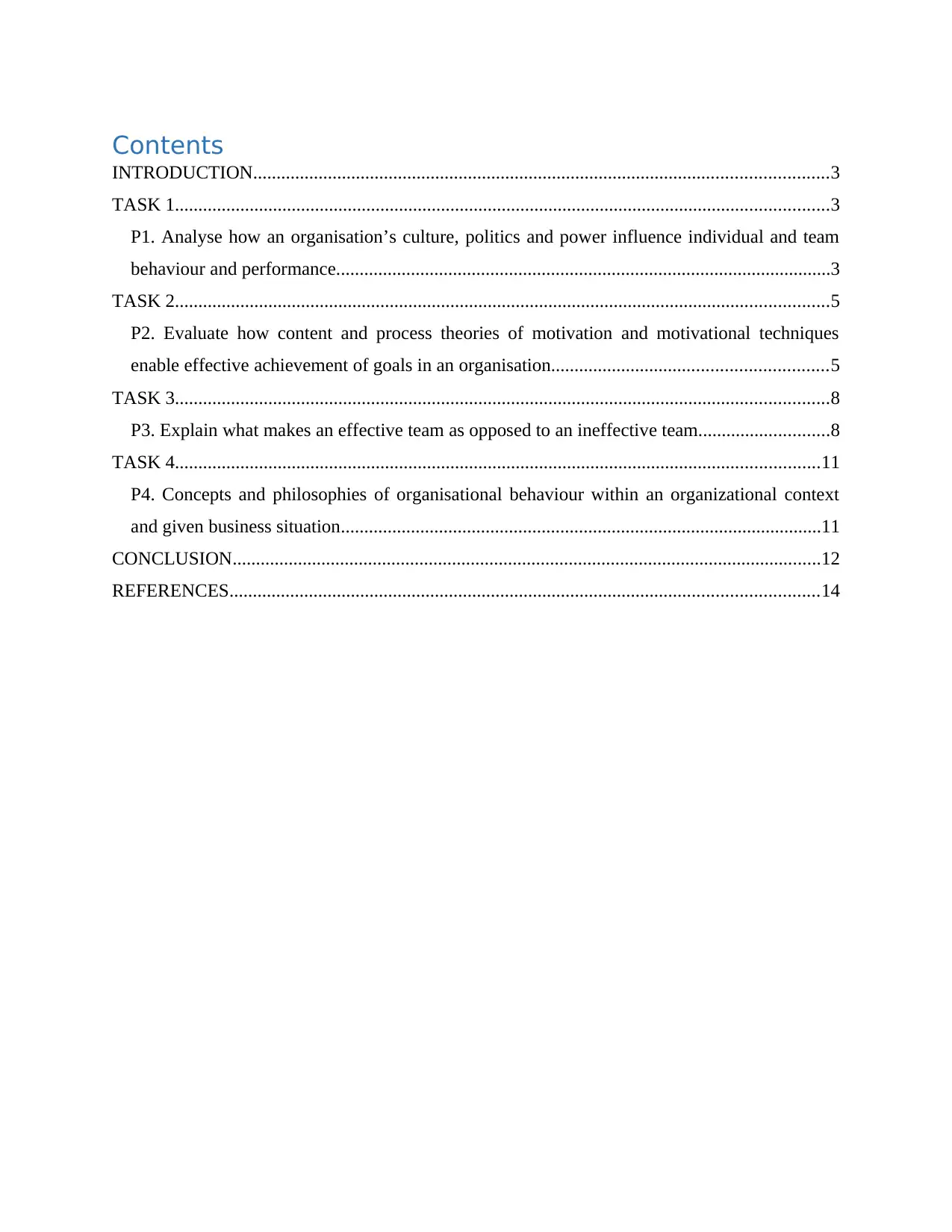
Contents
INTRODUCTION...........................................................................................................................3
TASK 1............................................................................................................................................3
P1. Analyse how an organisation’s culture, politics and power influence individual and team
behaviour and performance..........................................................................................................3
TASK 2............................................................................................................................................5
P2. Evaluate how content and process theories of motivation and motivational techniques
enable effective achievement of goals in an organisation...........................................................5
TASK 3............................................................................................................................................8
P3. Explain what makes an effective team as opposed to an ineffective team............................8
TASK 4..........................................................................................................................................11
P4. Concepts and philosophies of organisational behaviour within an organizational context
and given business situation.......................................................................................................11
CONCLUSION..............................................................................................................................12
REFERENCES..............................................................................................................................14
INTRODUCTION...........................................................................................................................3
TASK 1............................................................................................................................................3
P1. Analyse how an organisation’s culture, politics and power influence individual and team
behaviour and performance..........................................................................................................3
TASK 2............................................................................................................................................5
P2. Evaluate how content and process theories of motivation and motivational techniques
enable effective achievement of goals in an organisation...........................................................5
TASK 3............................................................................................................................................8
P3. Explain what makes an effective team as opposed to an ineffective team............................8
TASK 4..........................................................................................................................................11
P4. Concepts and philosophies of organisational behaviour within an organizational context
and given business situation.......................................................................................................11
CONCLUSION..............................................................................................................................12
REFERENCES..............................................................................................................................14
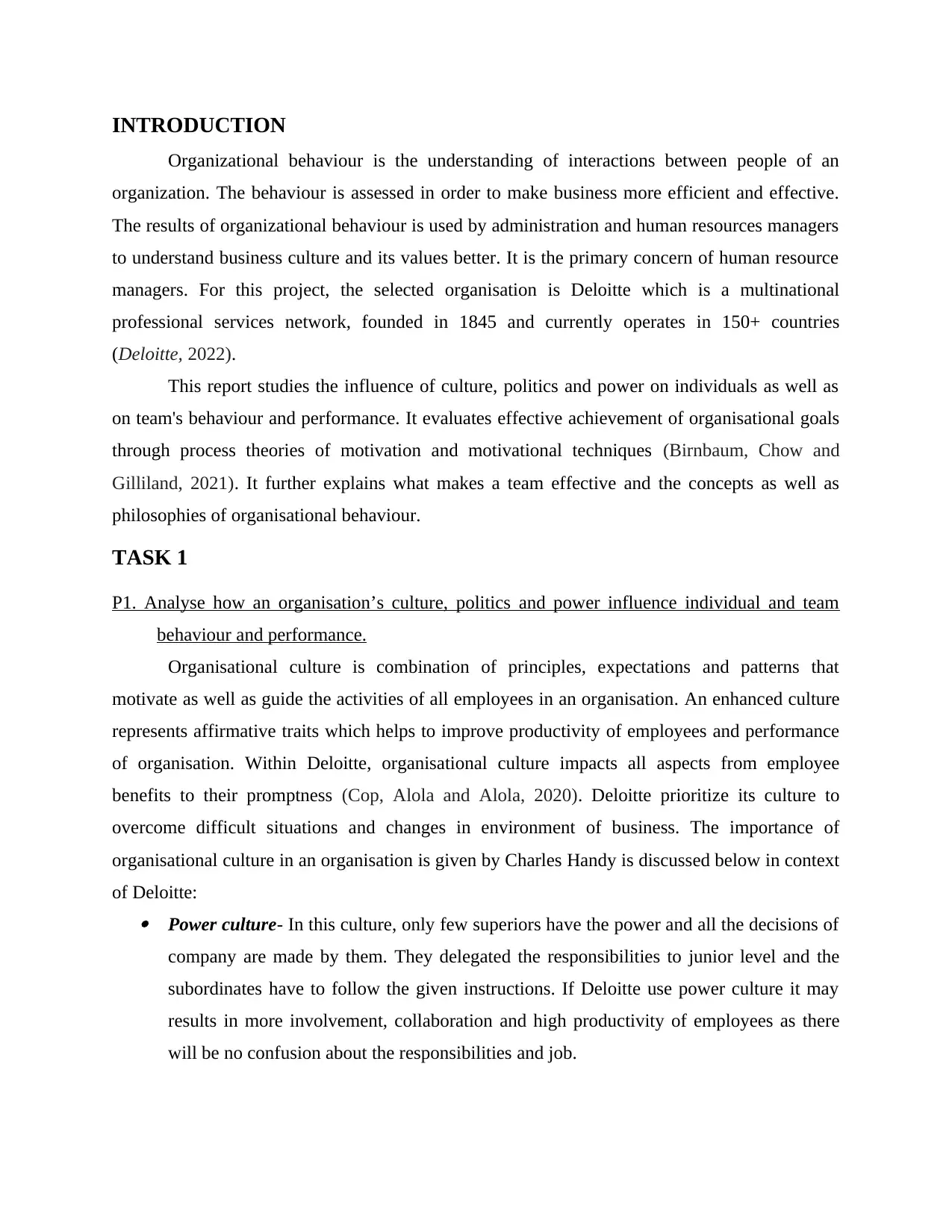
INTRODUCTION
Organizational behaviour is the understanding of interactions between people of an
organization. The behaviour is assessed in order to make business more efficient and effective.
The results of organizational behaviour is used by administration and human resources managers
to understand business culture and its values better. It is the primary concern of human resource
managers. For this project, the selected organisation is Deloitte which is a multinational
professional services network, founded in 1845 and currently operates in 150+ countries
(Deloitte, 2022).
This report studies the influence of culture, politics and power on individuals as well as
on team's behaviour and performance. It evaluates effective achievement of organisational goals
through process theories of motivation and motivational techniques (Birnbaum, Chow and
Gilliland, 2021). It further explains what makes a team effective and the concepts as well as
philosophies of organisational behaviour.
TASK 1
P1. Analyse how an organisation’s culture, politics and power influence individual and team
behaviour and performance.
Organisational culture is combination of principles, expectations and patterns that
motivate as well as guide the activities of all employees in an organisation. An enhanced culture
represents affirmative traits which helps to improve productivity of employees and performance
of organisation. Within Deloitte, organisational culture impacts all aspects from employee
benefits to their promptness (Cop, Alola and Alola, 2020). Deloitte prioritize its culture to
overcome difficult situations and changes in environment of business. The importance of
organisational culture in an organisation is given by Charles Handy is discussed below in context
of Deloitte: Power culture- In this culture, only few superiors have the power and all the decisions of
company are made by them. They delegated the responsibilities to junior level and the
subordinates have to follow the given instructions. If Deloitte use power culture it may
results in more involvement, collaboration and high productivity of employees as there
will be no confusion about the responsibilities and job.
Organizational behaviour is the understanding of interactions between people of an
organization. The behaviour is assessed in order to make business more efficient and effective.
The results of organizational behaviour is used by administration and human resources managers
to understand business culture and its values better. It is the primary concern of human resource
managers. For this project, the selected organisation is Deloitte which is a multinational
professional services network, founded in 1845 and currently operates in 150+ countries
(Deloitte, 2022).
This report studies the influence of culture, politics and power on individuals as well as
on team's behaviour and performance. It evaluates effective achievement of organisational goals
through process theories of motivation and motivational techniques (Birnbaum, Chow and
Gilliland, 2021). It further explains what makes a team effective and the concepts as well as
philosophies of organisational behaviour.
TASK 1
P1. Analyse how an organisation’s culture, politics and power influence individual and team
behaviour and performance.
Organisational culture is combination of principles, expectations and patterns that
motivate as well as guide the activities of all employees in an organisation. An enhanced culture
represents affirmative traits which helps to improve productivity of employees and performance
of organisation. Within Deloitte, organisational culture impacts all aspects from employee
benefits to their promptness (Cop, Alola and Alola, 2020). Deloitte prioritize its culture to
overcome difficult situations and changes in environment of business. The importance of
organisational culture in an organisation is given by Charles Handy is discussed below in context
of Deloitte: Power culture- In this culture, only few superiors have the power and all the decisions of
company are made by them. They delegated the responsibilities to junior level and the
subordinates have to follow the given instructions. If Deloitte use power culture it may
results in more involvement, collaboration and high productivity of employees as there
will be no confusion about the responsibilities and job.
⊘ This is a preview!⊘
Do you want full access?
Subscribe today to unlock all pages.

Trusted by 1+ million students worldwide
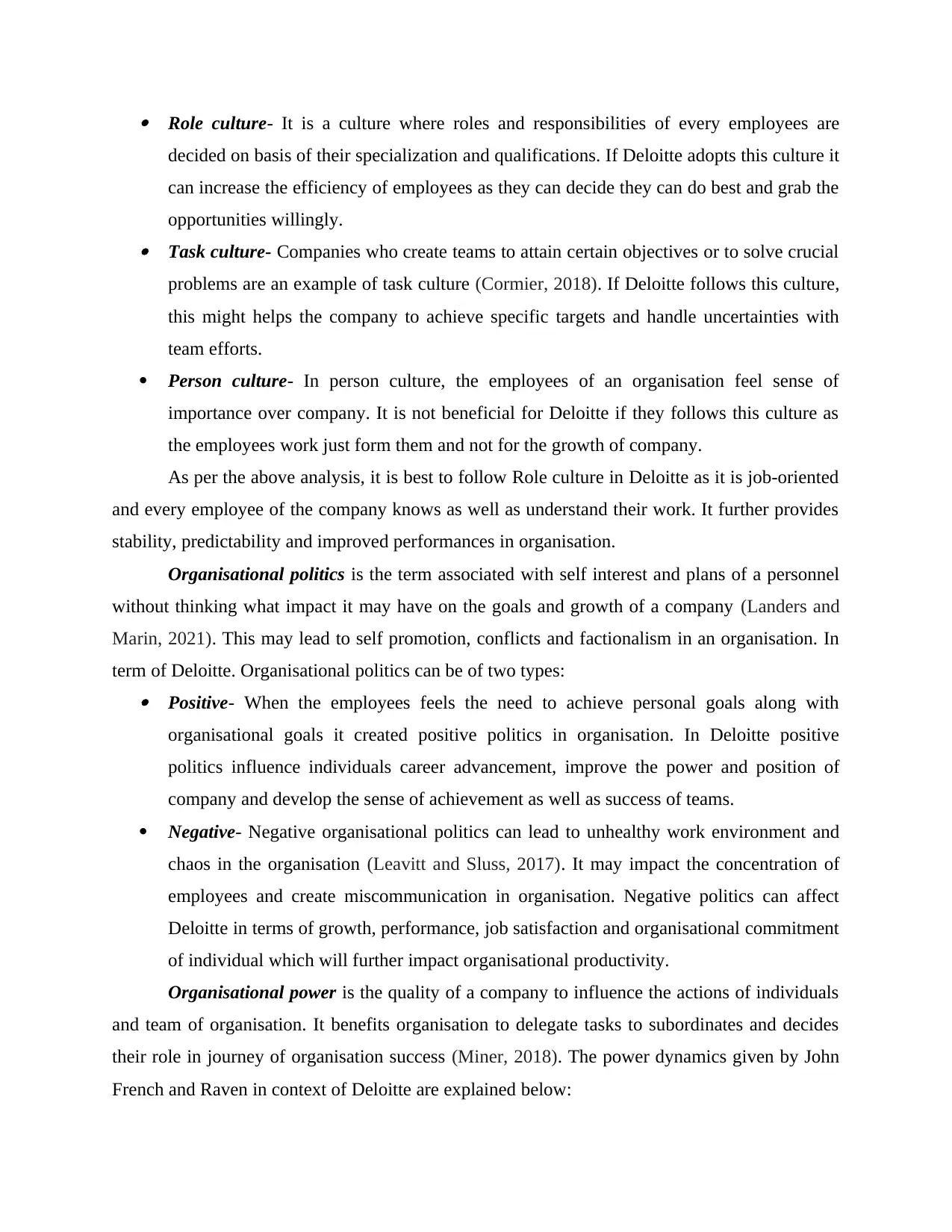
Role culture- It is a culture where roles and responsibilities of every employees are
decided on basis of their specialization and qualifications. If Deloitte adopts this culture it
can increase the efficiency of employees as they can decide they can do best and grab the
opportunities willingly. Task culture- Companies who create teams to attain certain objectives or to solve crucial
problems are an example of task culture (Cormier, 2018). If Deloitte follows this culture,
this might helps the company to achieve specific targets and handle uncertainties with
team efforts.
Person culture- In person culture, the employees of an organisation feel sense of
importance over company. It is not beneficial for Deloitte if they follows this culture as
the employees work just form them and not for the growth of company.
As per the above analysis, it is best to follow Role culture in Deloitte as it is job-oriented
and every employee of the company knows as well as understand their work. It further provides
stability, predictability and improved performances in organisation.
Organisational politics is the term associated with self interest and plans of a personnel
without thinking what impact it may have on the goals and growth of a company (Landers and
Marin, 2021). This may lead to self promotion, conflicts and factionalism in an organisation. In
term of Deloitte. Organisational politics can be of two types: Positive- When the employees feels the need to achieve personal goals along with
organisational goals it created positive politics in organisation. In Deloitte positive
politics influence individuals career advancement, improve the power and position of
company and develop the sense of achievement as well as success of teams.
Negative- Negative organisational politics can lead to unhealthy work environment and
chaos in the organisation (Leavitt and Sluss, 2017). It may impact the concentration of
employees and create miscommunication in organisation. Negative politics can affect
Deloitte in terms of growth, performance, job satisfaction and organisational commitment
of individual which will further impact organisational productivity.
Organisational power is the quality of a company to influence the actions of individuals
and team of organisation. It benefits organisation to delegate tasks to subordinates and decides
their role in journey of organisation success (Miner, 2018). The power dynamics given by John
French and Raven in context of Deloitte are explained below:
decided on basis of their specialization and qualifications. If Deloitte adopts this culture it
can increase the efficiency of employees as they can decide they can do best and grab the
opportunities willingly. Task culture- Companies who create teams to attain certain objectives or to solve crucial
problems are an example of task culture (Cormier, 2018). If Deloitte follows this culture,
this might helps the company to achieve specific targets and handle uncertainties with
team efforts.
Person culture- In person culture, the employees of an organisation feel sense of
importance over company. It is not beneficial for Deloitte if they follows this culture as
the employees work just form them and not for the growth of company.
As per the above analysis, it is best to follow Role culture in Deloitte as it is job-oriented
and every employee of the company knows as well as understand their work. It further provides
stability, predictability and improved performances in organisation.
Organisational politics is the term associated with self interest and plans of a personnel
without thinking what impact it may have on the goals and growth of a company (Landers and
Marin, 2021). This may lead to self promotion, conflicts and factionalism in an organisation. In
term of Deloitte. Organisational politics can be of two types: Positive- When the employees feels the need to achieve personal goals along with
organisational goals it created positive politics in organisation. In Deloitte positive
politics influence individuals career advancement, improve the power and position of
company and develop the sense of achievement as well as success of teams.
Negative- Negative organisational politics can lead to unhealthy work environment and
chaos in the organisation (Leavitt and Sluss, 2017). It may impact the concentration of
employees and create miscommunication in organisation. Negative politics can affect
Deloitte in terms of growth, performance, job satisfaction and organisational commitment
of individual which will further impact organisational productivity.
Organisational power is the quality of a company to influence the actions of individuals
and team of organisation. It benefits organisation to delegate tasks to subordinates and decides
their role in journey of organisation success (Miner, 2018). The power dynamics given by John
French and Raven in context of Deloitte are explained below:
Paraphrase This Document
Need a fresh take? Get an instant paraphrase of this document with our AI Paraphraser
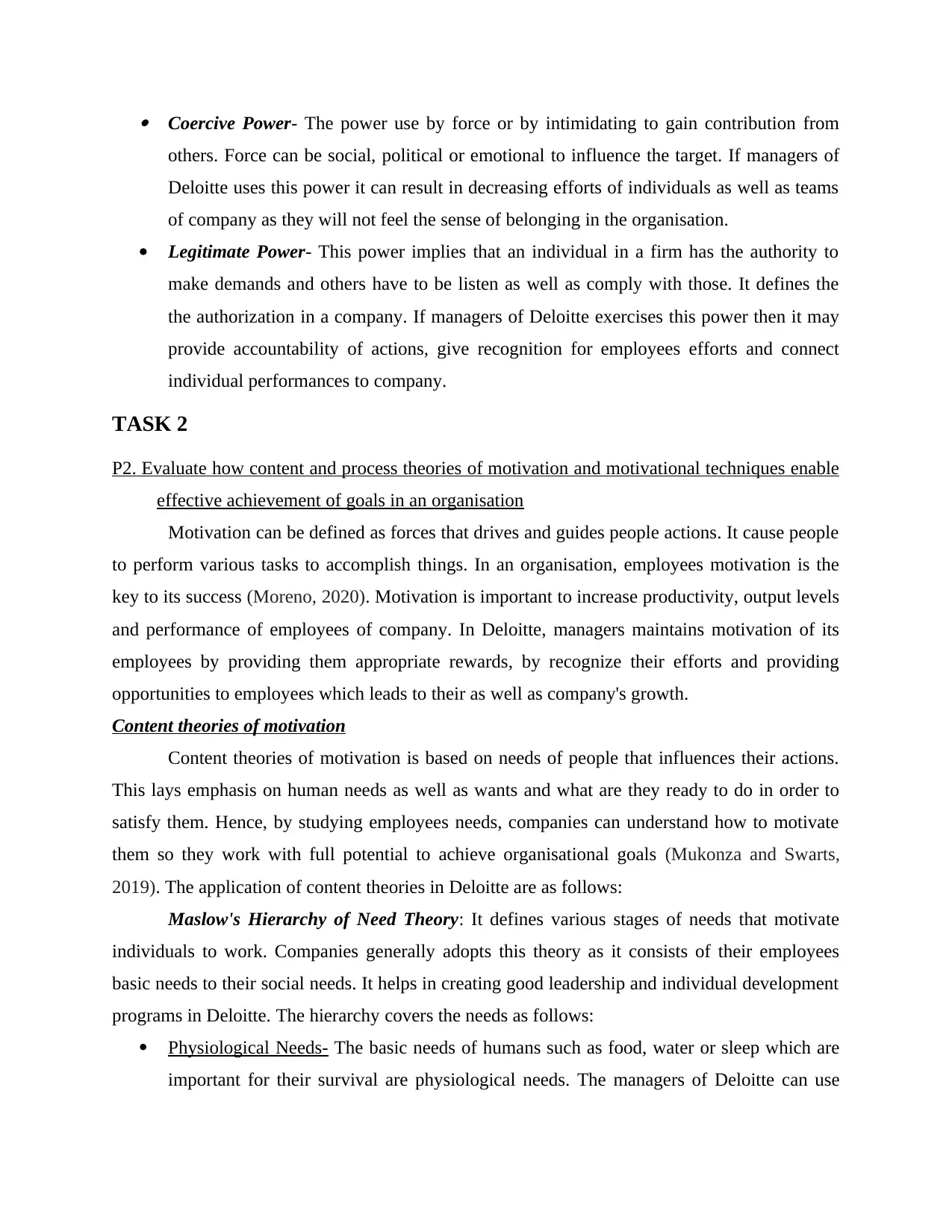
Coercive Power- The power use by force or by intimidating to gain contribution from
others. Force can be social, political or emotional to influence the target. If managers of
Deloitte uses this power it can result in decreasing efforts of individuals as well as teams
of company as they will not feel the sense of belonging in the organisation.
Legitimate Power- This power implies that an individual in a firm has the authority to
make demands and others have to be listen as well as comply with those. It defines the
the authorization in a company. If managers of Deloitte exercises this power then it may
provide accountability of actions, give recognition for employees efforts and connect
individual performances to company.
TASK 2
P2. Evaluate how content and process theories of motivation and motivational techniques enable
effective achievement of goals in an organisation
Motivation can be defined as forces that drives and guides people actions. It cause people
to perform various tasks to accomplish things. In an organisation, employees motivation is the
key to its success (Moreno, 2020). Motivation is important to increase productivity, output levels
and performance of employees of company. In Deloitte, managers maintains motivation of its
employees by providing them appropriate rewards, by recognize their efforts and providing
opportunities to employees which leads to their as well as company's growth.
Content theories of motivation
Content theories of motivation is based on needs of people that influences their actions.
This lays emphasis on human needs as well as wants and what are they ready to do in order to
satisfy them. Hence, by studying employees needs, companies can understand how to motivate
them so they work with full potential to achieve organisational goals (Mukonza and Swarts,
2019). The application of content theories in Deloitte are as follows:
Maslow's Hierarchy of Need Theory: It defines various stages of needs that motivate
individuals to work. Companies generally adopts this theory as it consists of their employees
basic needs to their social needs. It helps in creating good leadership and individual development
programs in Deloitte. The hierarchy covers the needs as follows:
Physiological Needs- The basic needs of humans such as food, water or sleep which are
important for their survival are physiological needs. The managers of Deloitte can use
others. Force can be social, political or emotional to influence the target. If managers of
Deloitte uses this power it can result in decreasing efforts of individuals as well as teams
of company as they will not feel the sense of belonging in the organisation.
Legitimate Power- This power implies that an individual in a firm has the authority to
make demands and others have to be listen as well as comply with those. It defines the
the authorization in a company. If managers of Deloitte exercises this power then it may
provide accountability of actions, give recognition for employees efforts and connect
individual performances to company.
TASK 2
P2. Evaluate how content and process theories of motivation and motivational techniques enable
effective achievement of goals in an organisation
Motivation can be defined as forces that drives and guides people actions. It cause people
to perform various tasks to accomplish things. In an organisation, employees motivation is the
key to its success (Moreno, 2020). Motivation is important to increase productivity, output levels
and performance of employees of company. In Deloitte, managers maintains motivation of its
employees by providing them appropriate rewards, by recognize their efforts and providing
opportunities to employees which leads to their as well as company's growth.
Content theories of motivation
Content theories of motivation is based on needs of people that influences their actions.
This lays emphasis on human needs as well as wants and what are they ready to do in order to
satisfy them. Hence, by studying employees needs, companies can understand how to motivate
them so they work with full potential to achieve organisational goals (Mukonza and Swarts,
2019). The application of content theories in Deloitte are as follows:
Maslow's Hierarchy of Need Theory: It defines various stages of needs that motivate
individuals to work. Companies generally adopts this theory as it consists of their employees
basic needs to their social needs. It helps in creating good leadership and individual development
programs in Deloitte. The hierarchy covers the needs as follows:
Physiological Needs- The basic needs of humans such as food, water or sleep which are
important for their survival are physiological needs. The managers of Deloitte can use
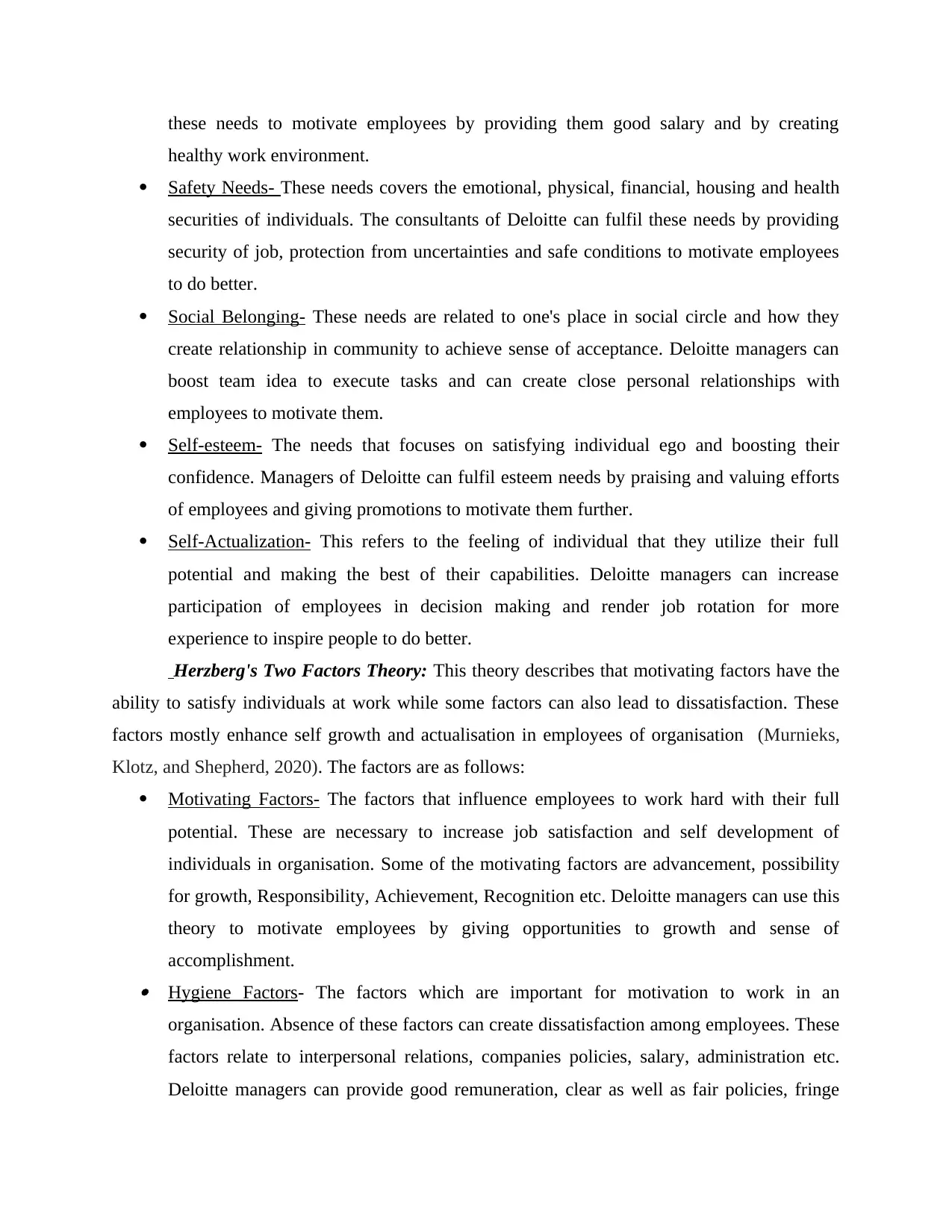
these needs to motivate employees by providing them good salary and by creating
healthy work environment.
Safety Needs- These needs covers the emotional, physical, financial, housing and health
securities of individuals. The consultants of Deloitte can fulfil these needs by providing
security of job, protection from uncertainties and safe conditions to motivate employees
to do better.
Social Belonging- These needs are related to one's place in social circle and how they
create relationship in community to achieve sense of acceptance. Deloitte managers can
boost team idea to execute tasks and can create close personal relationships with
employees to motivate them.
Self-esteem- The needs that focuses on satisfying individual ego and boosting their
confidence. Managers of Deloitte can fulfil esteem needs by praising and valuing efforts
of employees and giving promotions to motivate them further.
Self-Actualization- This refers to the feeling of individual that they utilize their full
potential and making the best of their capabilities. Deloitte managers can increase
participation of employees in decision making and render job rotation for more
experience to inspire people to do better.
Herzberg's Two Factors Theory: This theory describes that motivating factors have the
ability to satisfy individuals at work while some factors can also lead to dissatisfaction. These
factors mostly enhance self growth and actualisation in employees of organisation (Murnieks,
Klotz, and Shepherd, 2020). The factors are as follows:
Motivating Factors- The factors that influence employees to work hard with their full
potential. These are necessary to increase job satisfaction and self development of
individuals in organisation. Some of the motivating factors are advancement, possibility
for growth, Responsibility, Achievement, Recognition etc. Deloitte managers can use this
theory to motivate employees by giving opportunities to growth and sense of
accomplishment. Hygiene Factors- The factors which are important for motivation to work in an
organisation. Absence of these factors can create dissatisfaction among employees. These
factors relate to interpersonal relations, companies policies, salary, administration etc.
Deloitte managers can provide good remuneration, clear as well as fair policies, fringe
healthy work environment.
Safety Needs- These needs covers the emotional, physical, financial, housing and health
securities of individuals. The consultants of Deloitte can fulfil these needs by providing
security of job, protection from uncertainties and safe conditions to motivate employees
to do better.
Social Belonging- These needs are related to one's place in social circle and how they
create relationship in community to achieve sense of acceptance. Deloitte managers can
boost team idea to execute tasks and can create close personal relationships with
employees to motivate them.
Self-esteem- The needs that focuses on satisfying individual ego and boosting their
confidence. Managers of Deloitte can fulfil esteem needs by praising and valuing efforts
of employees and giving promotions to motivate them further.
Self-Actualization- This refers to the feeling of individual that they utilize their full
potential and making the best of their capabilities. Deloitte managers can increase
participation of employees in decision making and render job rotation for more
experience to inspire people to do better.
Herzberg's Two Factors Theory: This theory describes that motivating factors have the
ability to satisfy individuals at work while some factors can also lead to dissatisfaction. These
factors mostly enhance self growth and actualisation in employees of organisation (Murnieks,
Klotz, and Shepherd, 2020). The factors are as follows:
Motivating Factors- The factors that influence employees to work hard with their full
potential. These are necessary to increase job satisfaction and self development of
individuals in organisation. Some of the motivating factors are advancement, possibility
for growth, Responsibility, Achievement, Recognition etc. Deloitte managers can use this
theory to motivate employees by giving opportunities to growth and sense of
accomplishment. Hygiene Factors- The factors which are important for motivation to work in an
organisation. Absence of these factors can create dissatisfaction among employees. These
factors relate to interpersonal relations, companies policies, salary, administration etc.
Deloitte managers can provide good remuneration, clear as well as fair policies, fringe
⊘ This is a preview!⊘
Do you want full access?
Subscribe today to unlock all pages.

Trusted by 1+ million students worldwide
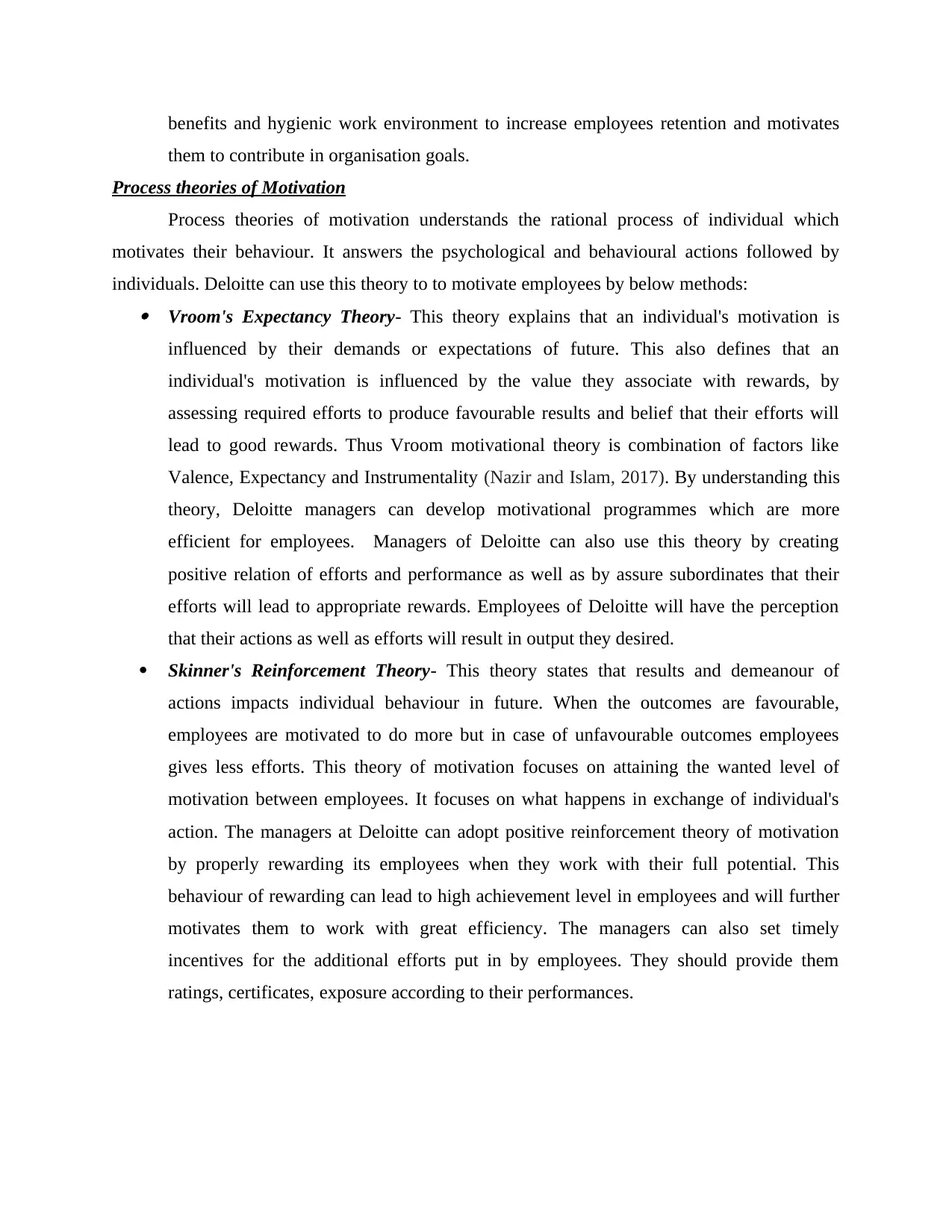
benefits and hygienic work environment to increase employees retention and motivates
them to contribute in organisation goals.
Process theories of Motivation
Process theories of motivation understands the rational process of individual which
motivates their behaviour. It answers the psychological and behavioural actions followed by
individuals. Deloitte can use this theory to to motivate employees by below methods: Vroom's Expectancy Theory- This theory explains that an individual's motivation is
influenced by their demands or expectations of future. This also defines that an
individual's motivation is influenced by the value they associate with rewards, by
assessing required efforts to produce favourable results and belief that their efforts will
lead to good rewards. Thus Vroom motivational theory is combination of factors like
Valence, Expectancy and Instrumentality (Nazir and Islam, 2017). By understanding this
theory, Deloitte managers can develop motivational programmes which are more
efficient for employees. Managers of Deloitte can also use this theory by creating
positive relation of efforts and performance as well as by assure subordinates that their
efforts will lead to appropriate rewards. Employees of Deloitte will have the perception
that their actions as well as efforts will result in output they desired.
Skinner's Reinforcement Theory- This theory states that results and demeanour of
actions impacts individual behaviour in future. When the outcomes are favourable,
employees are motivated to do more but in case of unfavourable outcomes employees
gives less efforts. This theory of motivation focuses on attaining the wanted level of
motivation between employees. It focuses on what happens in exchange of individual's
action. The managers at Deloitte can adopt positive reinforcement theory of motivation
by properly rewarding its employees when they work with their full potential. This
behaviour of rewarding can lead to high achievement level in employees and will further
motivates them to work with great efficiency. The managers can also set timely
incentives for the additional efforts put in by employees. They should provide them
ratings, certificates, exposure according to their performances.
them to contribute in organisation goals.
Process theories of Motivation
Process theories of motivation understands the rational process of individual which
motivates their behaviour. It answers the psychological and behavioural actions followed by
individuals. Deloitte can use this theory to to motivate employees by below methods: Vroom's Expectancy Theory- This theory explains that an individual's motivation is
influenced by their demands or expectations of future. This also defines that an
individual's motivation is influenced by the value they associate with rewards, by
assessing required efforts to produce favourable results and belief that their efforts will
lead to good rewards. Thus Vroom motivational theory is combination of factors like
Valence, Expectancy and Instrumentality (Nazir and Islam, 2017). By understanding this
theory, Deloitte managers can develop motivational programmes which are more
efficient for employees. Managers of Deloitte can also use this theory by creating
positive relation of efforts and performance as well as by assure subordinates that their
efforts will lead to appropriate rewards. Employees of Deloitte will have the perception
that their actions as well as efforts will result in output they desired.
Skinner's Reinforcement Theory- This theory states that results and demeanour of
actions impacts individual behaviour in future. When the outcomes are favourable,
employees are motivated to do more but in case of unfavourable outcomes employees
gives less efforts. This theory of motivation focuses on attaining the wanted level of
motivation between employees. It focuses on what happens in exchange of individual's
action. The managers at Deloitte can adopt positive reinforcement theory of motivation
by properly rewarding its employees when they work with their full potential. This
behaviour of rewarding can lead to high achievement level in employees and will further
motivates them to work with great efficiency. The managers can also set timely
incentives for the additional efforts put in by employees. They should provide them
ratings, certificates, exposure according to their performances.
Paraphrase This Document
Need a fresh take? Get an instant paraphrase of this document with our AI Paraphraser
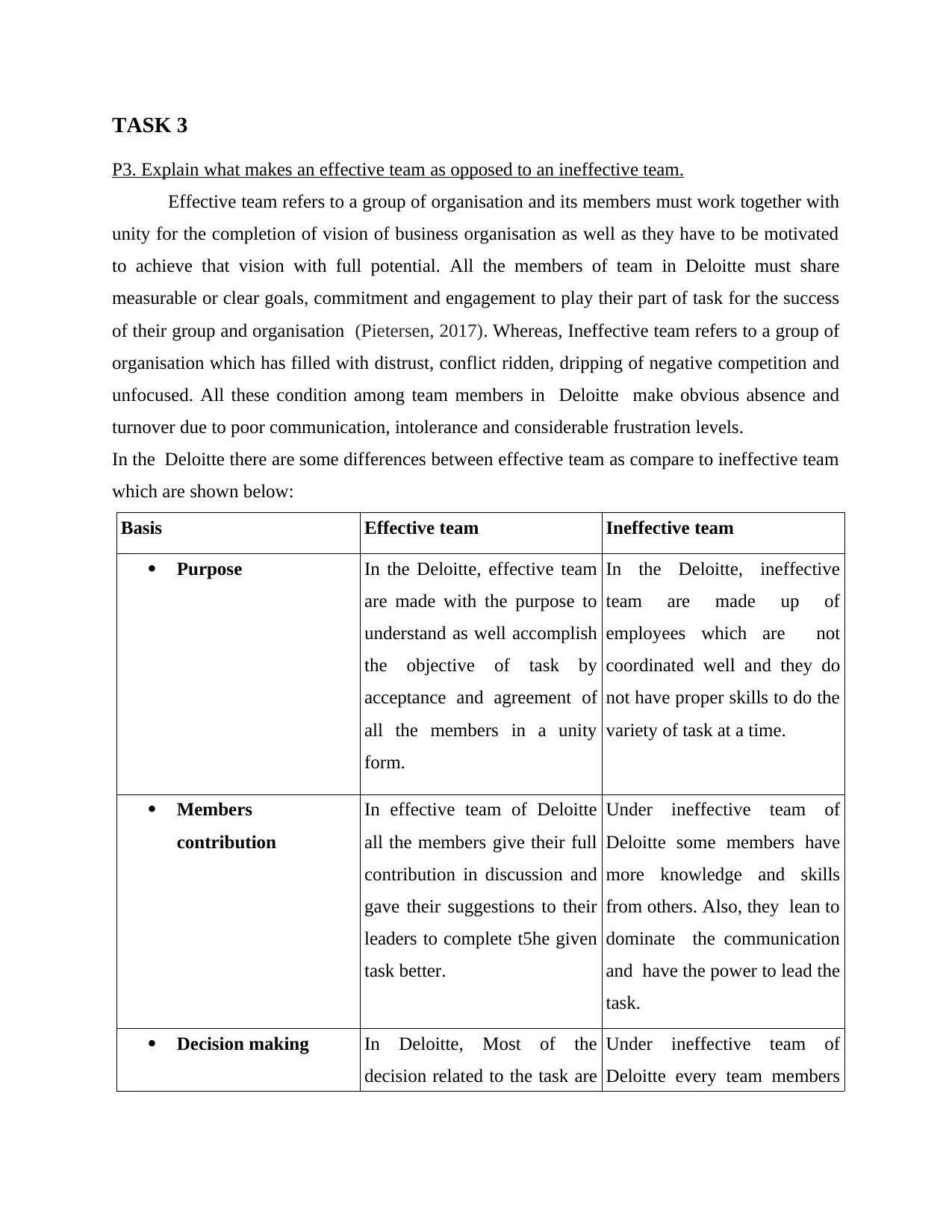
TASK 3
P3. Explain what makes an effective team as opposed to an ineffective team.
Effective team refers to a group of organisation and its members must work together with
unity for the completion of vision of business organisation as well as they have to be motivated
to achieve that vision with full potential. All the members of team in Deloitte must share
measurable or clear goals, commitment and engagement to play their part of task for the success
of their group and organisation (Pietersen, 2017). Whereas, Ineffective team refers to a group of
organisation which has filled with distrust, conflict ridden, dripping of negative competition and
unfocused. All these condition among team members in Deloitte make obvious absence and
turnover due to poor communication, intolerance and considerable frustration levels.
In the Deloitte there are some differences between effective team as compare to ineffective team
which are shown below:
Basis Effective team Ineffective team
Purpose In the Deloitte, effective team
are made with the purpose to
understand as well accomplish
the objective of task by
acceptance and agreement of
all the members in a unity
form.
In the Deloitte, ineffective
team are made up of
employees which are not
coordinated well and they do
not have proper skills to do the
variety of task at a time.
Members
contribution
In effective team of Deloitte
all the members give their full
contribution in discussion and
gave their suggestions to their
leaders to complete t5he given
task better.
Under ineffective team of
Deloitte some members have
more knowledge and skills
from others. Also, they lean to
dominate the communication
and have the power to lead the
task.
Decision making In Deloitte, Most of the
decision related to the task are
Under ineffective team of
Deloitte every team members
P3. Explain what makes an effective team as opposed to an ineffective team.
Effective team refers to a group of organisation and its members must work together with
unity for the completion of vision of business organisation as well as they have to be motivated
to achieve that vision with full potential. All the members of team in Deloitte must share
measurable or clear goals, commitment and engagement to play their part of task for the success
of their group and organisation (Pietersen, 2017). Whereas, Ineffective team refers to a group of
organisation which has filled with distrust, conflict ridden, dripping of negative competition and
unfocused. All these condition among team members in Deloitte make obvious absence and
turnover due to poor communication, intolerance and considerable frustration levels.
In the Deloitte there are some differences between effective team as compare to ineffective team
which are shown below:
Basis Effective team Ineffective team
Purpose In the Deloitte, effective team
are made with the purpose to
understand as well accomplish
the objective of task by
acceptance and agreement of
all the members in a unity
form.
In the Deloitte, ineffective
team are made up of
employees which are not
coordinated well and they do
not have proper skills to do the
variety of task at a time.
Members
contribution
In effective team of Deloitte
all the members give their full
contribution in discussion and
gave their suggestions to their
leaders to complete t5he given
task better.
Under ineffective team of
Deloitte some members have
more knowledge and skills
from others. Also, they lean to
dominate the communication
and have the power to lead the
task.
Decision making In Deloitte, Most of the
decision related to the task are
Under ineffective team of
Deloitte every team members
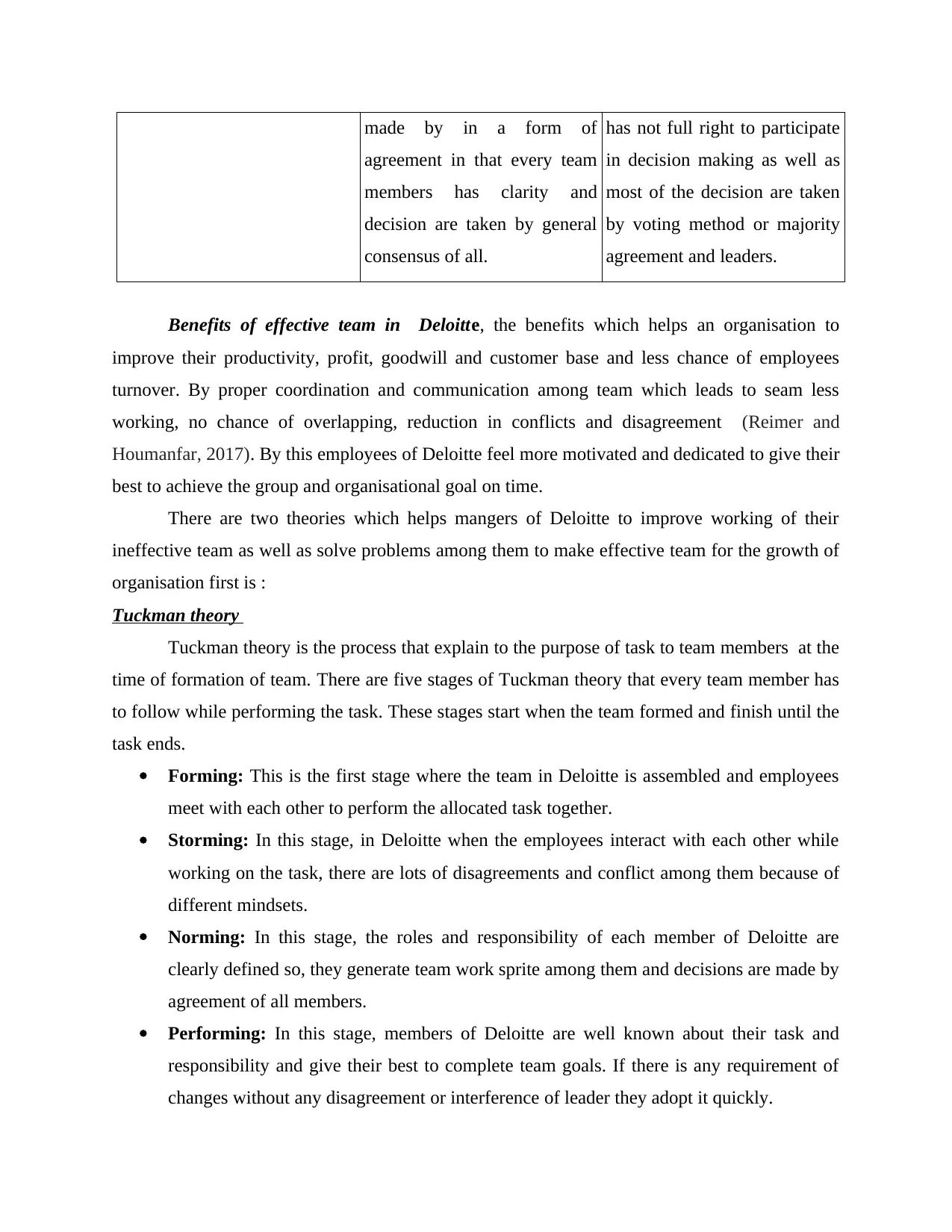
made by in a form of
agreement in that every team
members has clarity and
decision are taken by general
consensus of all.
has not full right to participate
in decision making as well as
most of the decision are taken
by voting method or majority
agreement and leaders.
Benefits of effective team in Deloitte, the benefits which helps an organisation to
improve their productivity, profit, goodwill and customer base and less chance of employees
turnover. By proper coordination and communication among team which leads to seam less
working, no chance of overlapping, reduction in conflicts and disagreement (Reimer and
Houmanfar, 2017). By this employees of Deloitte feel more motivated and dedicated to give their
best to achieve the group and organisational goal on time.
There are two theories which helps mangers of Deloitte to improve working of their
ineffective team as well as solve problems among them to make effective team for the growth of
organisation first is :
Tuckman theory
Tuckman theory is the process that explain to the purpose of task to team members at the
time of formation of team. There are five stages of Tuckman theory that every team member has
to follow while performing the task. These stages start when the team formed and finish until the
task ends.
Forming: This is the first stage where the team in Deloitte is assembled and employees
meet with each other to perform the allocated task together.
Storming: In this stage, in Deloitte when the employees interact with each other while
working on the task, there are lots of disagreements and conflict among them because of
different mindsets.
Norming: In this stage, the roles and responsibility of each member of Deloitte are
clearly defined so, they generate team work sprite among them and decisions are made by
agreement of all members.
Performing: In this stage, members of Deloitte are well known about their task and
responsibility and give their best to complete team goals. If there is any requirement of
changes without any disagreement or interference of leader they adopt it quickly.
agreement in that every team
members has clarity and
decision are taken by general
consensus of all.
has not full right to participate
in decision making as well as
most of the decision are taken
by voting method or majority
agreement and leaders.
Benefits of effective team in Deloitte, the benefits which helps an organisation to
improve their productivity, profit, goodwill and customer base and less chance of employees
turnover. By proper coordination and communication among team which leads to seam less
working, no chance of overlapping, reduction in conflicts and disagreement (Reimer and
Houmanfar, 2017). By this employees of Deloitte feel more motivated and dedicated to give their
best to achieve the group and organisational goal on time.
There are two theories which helps mangers of Deloitte to improve working of their
ineffective team as well as solve problems among them to make effective team for the growth of
organisation first is :
Tuckman theory
Tuckman theory is the process that explain to the purpose of task to team members at the
time of formation of team. There are five stages of Tuckman theory that every team member has
to follow while performing the task. These stages start when the team formed and finish until the
task ends.
Forming: This is the first stage where the team in Deloitte is assembled and employees
meet with each other to perform the allocated task together.
Storming: In this stage, in Deloitte when the employees interact with each other while
working on the task, there are lots of disagreements and conflict among them because of
different mindsets.
Norming: In this stage, the roles and responsibility of each member of Deloitte are
clearly defined so, they generate team work sprite among them and decisions are made by
agreement of all members.
Performing: In this stage, members of Deloitte are well known about their task and
responsibility and give their best to complete team goals. If there is any requirement of
changes without any disagreement or interference of leader they adopt it quickly.
⊘ This is a preview!⊘
Do you want full access?
Subscribe today to unlock all pages.

Trusted by 1+ million students worldwide
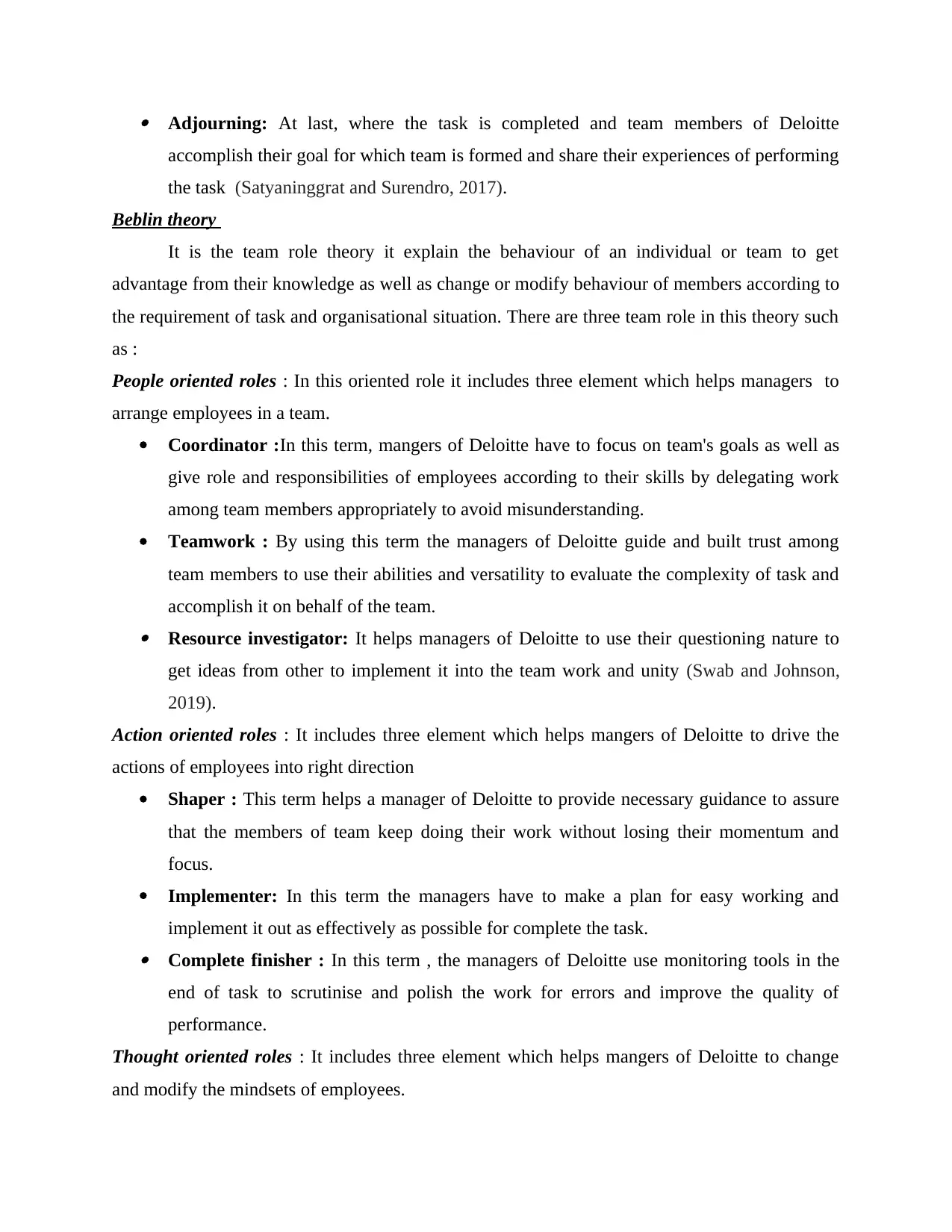
Adjourning: At last, where the task is completed and team members of Deloitte
accomplish their goal for which team is formed and share their experiences of performing
the task (Satyaninggrat and Surendro, 2017).
Beblin theory
It is the team role theory it explain the behaviour of an individual or team to get
advantage from their knowledge as well as change or modify behaviour of members according to
the requirement of task and organisational situation. There are three team role in this theory such
as :
People oriented roles : In this oriented role it includes three element which helps managers to
arrange employees in a team.
Coordinator :In this term, mangers of Deloitte have to focus on team's goals as well as
give role and responsibilities of employees according to their skills by delegating work
among team members appropriately to avoid misunderstanding.
Teamwork : By using this term the managers of Deloitte guide and built trust among
team members to use their abilities and versatility to evaluate the complexity of task and
accomplish it on behalf of the team. Resource investigator: It helps managers of Deloitte to use their questioning nature to
get ideas from other to implement it into the team work and unity (Swab and Johnson,
2019).
Action oriented roles : It includes three element which helps mangers of Deloitte to drive the
actions of employees into right direction
Shaper : This term helps a manager of Deloitte to provide necessary guidance to assure
that the members of team keep doing their work without losing their momentum and
focus.
Implementer: In this term the managers have to make a plan for easy working and
implement it out as effectively as possible for complete the task. Complete finisher : In this term , the managers of Deloitte use monitoring tools in the
end of task to scrutinise and polish the work for errors and improve the quality of
performance.
Thought oriented roles : It includes three element which helps mangers of Deloitte to change
and modify the mindsets of employees.
accomplish their goal for which team is formed and share their experiences of performing
the task (Satyaninggrat and Surendro, 2017).
Beblin theory
It is the team role theory it explain the behaviour of an individual or team to get
advantage from their knowledge as well as change or modify behaviour of members according to
the requirement of task and organisational situation. There are three team role in this theory such
as :
People oriented roles : In this oriented role it includes three element which helps managers to
arrange employees in a team.
Coordinator :In this term, mangers of Deloitte have to focus on team's goals as well as
give role and responsibilities of employees according to their skills by delegating work
among team members appropriately to avoid misunderstanding.
Teamwork : By using this term the managers of Deloitte guide and built trust among
team members to use their abilities and versatility to evaluate the complexity of task and
accomplish it on behalf of the team. Resource investigator: It helps managers of Deloitte to use their questioning nature to
get ideas from other to implement it into the team work and unity (Swab and Johnson,
2019).
Action oriented roles : It includes three element which helps mangers of Deloitte to drive the
actions of employees into right direction
Shaper : This term helps a manager of Deloitte to provide necessary guidance to assure
that the members of team keep doing their work without losing their momentum and
focus.
Implementer: In this term the managers have to make a plan for easy working and
implement it out as effectively as possible for complete the task. Complete finisher : In this term , the managers of Deloitte use monitoring tools in the
end of task to scrutinise and polish the work for errors and improve the quality of
performance.
Thought oriented roles : It includes three element which helps mangers of Deloitte to change
and modify the mindsets of employees.
Paraphrase This Document
Need a fresh take? Get an instant paraphrase of this document with our AI Paraphraser
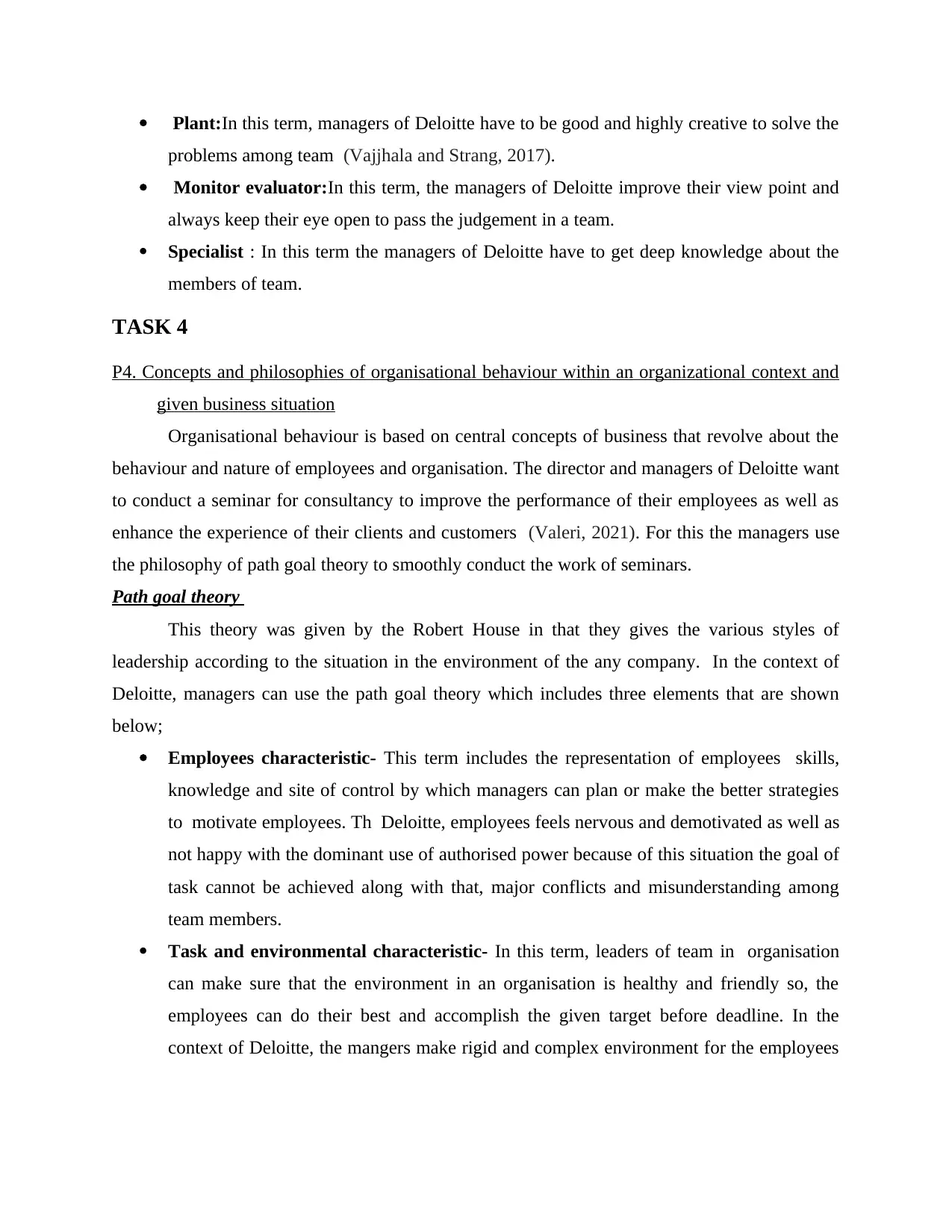
Plant:In this term, managers of Deloitte have to be good and highly creative to solve the
problems among team (Vajjhala and Strang, 2017).
Monitor evaluator:In this term, the managers of Deloitte improve their view point and
always keep their eye open to pass the judgement in a team.
Specialist : In this term the managers of Deloitte have to get deep knowledge about the
members of team.
TASK 4
P4. Concepts and philosophies of organisational behaviour within an organizational context and
given business situation
Organisational behaviour is based on central concepts of business that revolve about the
behaviour and nature of employees and organisation. The director and managers of Deloitte want
to conduct a seminar for consultancy to improve the performance of their employees as well as
enhance the experience of their clients and customers (Valeri, 2021). For this the managers use
the philosophy of path goal theory to smoothly conduct the work of seminars.
Path goal theory
This theory was given by the Robert House in that they gives the various styles of
leadership according to the situation in the environment of the any company. In the context of
Deloitte, managers can use the path goal theory which includes three elements that are shown
below;
Employees characteristic- This term includes the representation of employees skills,
knowledge and site of control by which managers can plan or make the better strategies
to motivate employees. Th Deloitte, employees feels nervous and demotivated as well as
not happy with the dominant use of authorised power because of this situation the goal of
task cannot be achieved along with that, major conflicts and misunderstanding among
team members.
Task and environmental characteristic- In this term, leaders of team in organisation
can make sure that the environment in an organisation is healthy and friendly so, the
employees can do their best and accomplish the given target before deadline. In the
context of Deloitte, the mangers make rigid and complex environment for the employees
problems among team (Vajjhala and Strang, 2017).
Monitor evaluator:In this term, the managers of Deloitte improve their view point and
always keep their eye open to pass the judgement in a team.
Specialist : In this term the managers of Deloitte have to get deep knowledge about the
members of team.
TASK 4
P4. Concepts and philosophies of organisational behaviour within an organizational context and
given business situation
Organisational behaviour is based on central concepts of business that revolve about the
behaviour and nature of employees and organisation. The director and managers of Deloitte want
to conduct a seminar for consultancy to improve the performance of their employees as well as
enhance the experience of their clients and customers (Valeri, 2021). For this the managers use
the philosophy of path goal theory to smoothly conduct the work of seminars.
Path goal theory
This theory was given by the Robert House in that they gives the various styles of
leadership according to the situation in the environment of the any company. In the context of
Deloitte, managers can use the path goal theory which includes three elements that are shown
below;
Employees characteristic- This term includes the representation of employees skills,
knowledge and site of control by which managers can plan or make the better strategies
to motivate employees. Th Deloitte, employees feels nervous and demotivated as well as
not happy with the dominant use of authorised power because of this situation the goal of
task cannot be achieved along with that, major conflicts and misunderstanding among
team members.
Task and environmental characteristic- In this term, leaders of team in organisation
can make sure that the environment in an organisation is healthy and friendly so, the
employees can do their best and accomplish the given target before deadline. In the
context of Deloitte, the mangers make rigid and complex environment for the employees
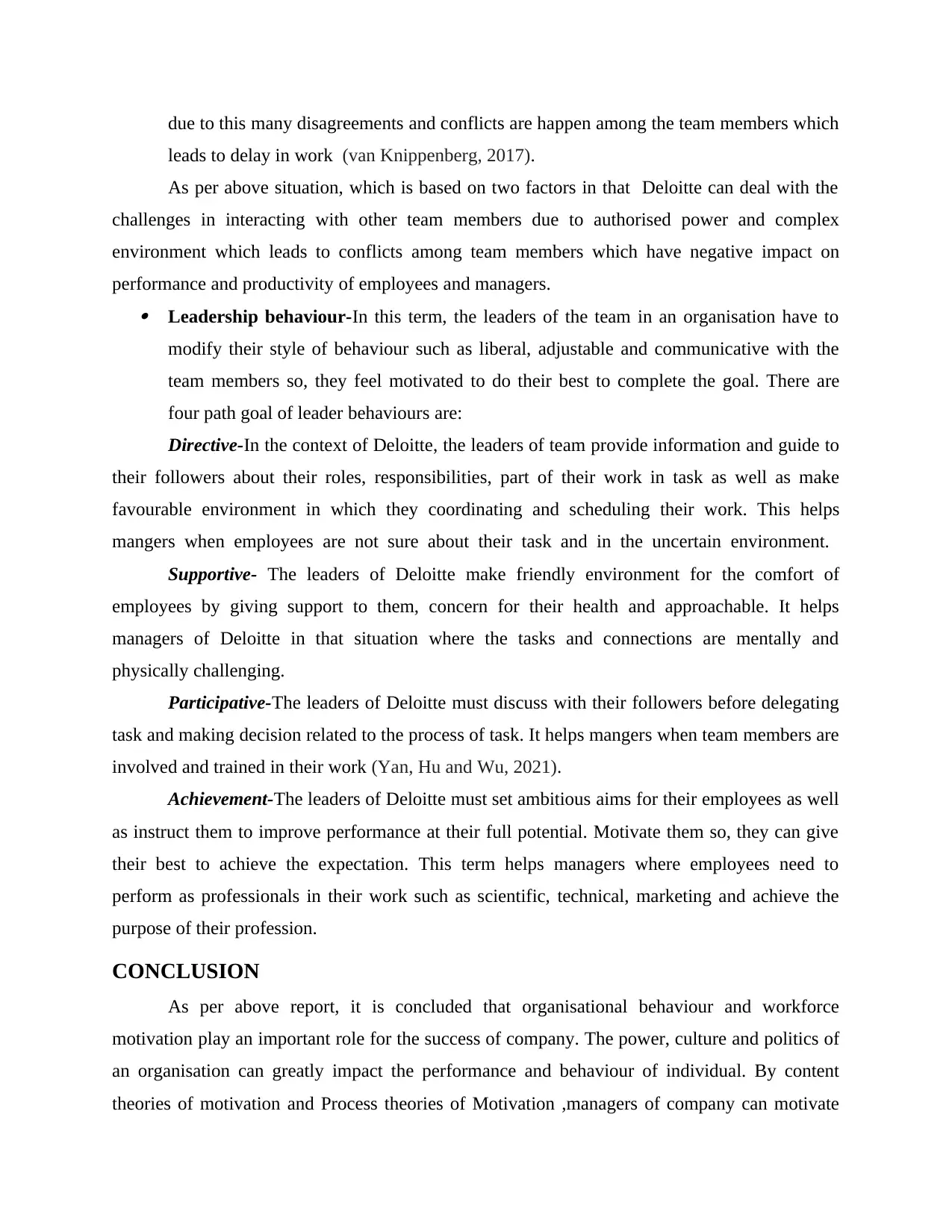
due to this many disagreements and conflicts are happen among the team members which
leads to delay in work (van Knippenberg, 2017).
As per above situation, which is based on two factors in that Deloitte can deal with the
challenges in interacting with other team members due to authorised power and complex
environment which leads to conflicts among team members which have negative impact on
performance and productivity of employees and managers. Leadership behaviour-In this term, the leaders of the team in an organisation have to
modify their style of behaviour such as liberal, adjustable and communicative with the
team members so, they feel motivated to do their best to complete the goal. There are
four path goal of leader behaviours are:
Directive-In the context of Deloitte, the leaders of team provide information and guide to
their followers about their roles, responsibilities, part of their work in task as well as make
favourable environment in which they coordinating and scheduling their work. This helps
mangers when employees are not sure about their task and in the uncertain environment.
Supportive- The leaders of Deloitte make friendly environment for the comfort of
employees by giving support to them, concern for their health and approachable. It helps
managers of Deloitte in that situation where the tasks and connections are mentally and
physically challenging.
Participative-The leaders of Deloitte must discuss with their followers before delegating
task and making decision related to the process of task. It helps mangers when team members are
involved and trained in their work (Yan, Hu and Wu, 2021).
Achievement-The leaders of Deloitte must set ambitious aims for their employees as well
as instruct them to improve performance at their full potential. Motivate them so, they can give
their best to achieve the expectation. This term helps managers where employees need to
perform as professionals in their work such as scientific, technical, marketing and achieve the
purpose of their profession.
CONCLUSION
As per above report, it is concluded that organisational behaviour and workforce
motivation play an important role for the success of company. The power, culture and politics of
an organisation can greatly impact the performance and behaviour of individual. By content
theories of motivation and Process theories of Motivation ,managers of company can motivate
leads to delay in work (van Knippenberg, 2017).
As per above situation, which is based on two factors in that Deloitte can deal with the
challenges in interacting with other team members due to authorised power and complex
environment which leads to conflicts among team members which have negative impact on
performance and productivity of employees and managers. Leadership behaviour-In this term, the leaders of the team in an organisation have to
modify their style of behaviour such as liberal, adjustable and communicative with the
team members so, they feel motivated to do their best to complete the goal. There are
four path goal of leader behaviours are:
Directive-In the context of Deloitte, the leaders of team provide information and guide to
their followers about their roles, responsibilities, part of their work in task as well as make
favourable environment in which they coordinating and scheduling their work. This helps
mangers when employees are not sure about their task and in the uncertain environment.
Supportive- The leaders of Deloitte make friendly environment for the comfort of
employees by giving support to them, concern for their health and approachable. It helps
managers of Deloitte in that situation where the tasks and connections are mentally and
physically challenging.
Participative-The leaders of Deloitte must discuss with their followers before delegating
task and making decision related to the process of task. It helps mangers when team members are
involved and trained in their work (Yan, Hu and Wu, 2021).
Achievement-The leaders of Deloitte must set ambitious aims for their employees as well
as instruct them to improve performance at their full potential. Motivate them so, they can give
their best to achieve the expectation. This term helps managers where employees need to
perform as professionals in their work such as scientific, technical, marketing and achieve the
purpose of their profession.
CONCLUSION
As per above report, it is concluded that organisational behaviour and workforce
motivation play an important role for the success of company. The power, culture and politics of
an organisation can greatly impact the performance and behaviour of individual. By content
theories of motivation and Process theories of Motivation ,managers of company can motivate
⊘ This is a preview!⊘
Do you want full access?
Subscribe today to unlock all pages.

Trusted by 1+ million students worldwide
1 out of 15
Related Documents
Your All-in-One AI-Powered Toolkit for Academic Success.
+13062052269
info@desklib.com
Available 24*7 on WhatsApp / Email
![[object Object]](/_next/static/media/star-bottom.7253800d.svg)
Unlock your academic potential
Copyright © 2020–2026 A2Z Services. All Rights Reserved. Developed and managed by ZUCOL.



